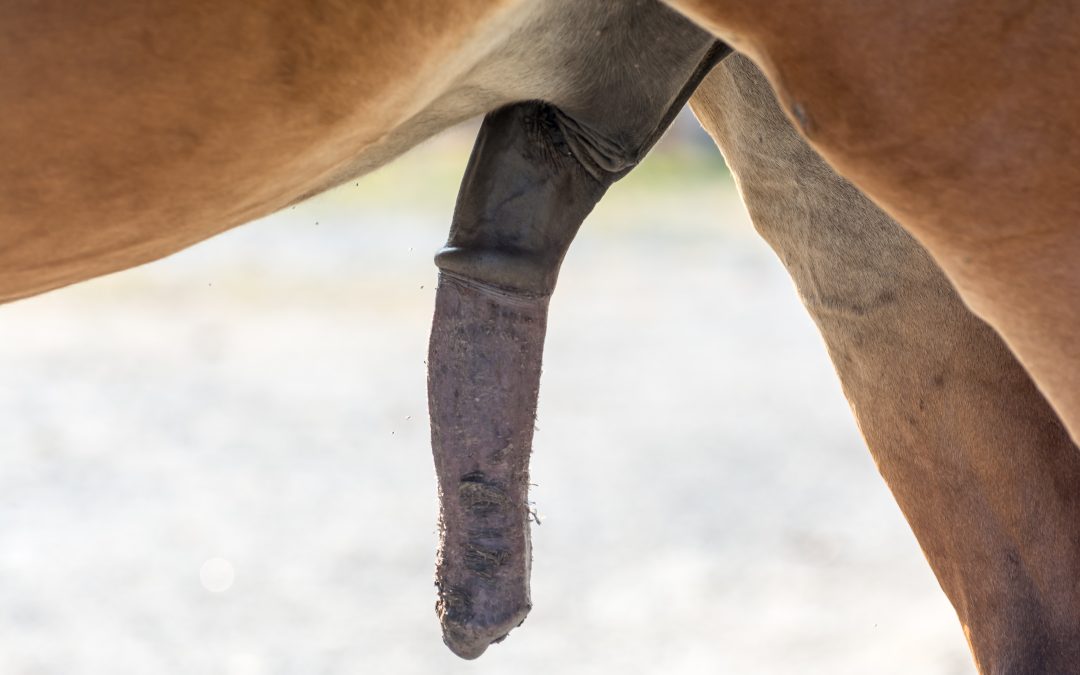Why do we clean sheaths in geldings:
- Hygiene: The sheath can accumulate dirt, debris, and smegma, which is a waxy secretion. If left uncleansed, this buildup can lead to irritation, discomfort, and even infection.
- Prevention of Infections: A dirty sheath can provide an ideal environment for bacteria and fungi to thrive, potentially leading to infections such as balanoposthitis (inflammation of the penis and prepuce) or dermatitis.
- Prevention of Bean Formation: Inside the sheath, a small accumulation of smegma known as a “bean” can form around the urethral opening. If not removed, this bean can interfere with urination and cause discomfort for the horse.
- Comfort and Well-being: Regular cleaning of the sheath can help keep the area clean and comfortable for the horse. It can also prevent discomfort during urination and mating.
How to clean a sheath:
- You will need warm water (baby bath temperature), clean towels or cloths, and a pair of gloves.
- Some horses may stand quietly for sheath cleaning, while others may require sedation or the assistance of a handler to hold them.
- Begin by gently cleaning the outer area of the sheath and the surrounding skin with a damp cloth or sponge. Use warm water and mild soap to remove any dirt, debris, or dried smegma.
- Gently retract the horse’s penis from the sheath. This should be done slowly and carefully to avoid startling or causing discomfort to the horse.
- of the sheath to remove accumulated dirt, debris, and smegma. Take care not to use excessive pressure, as this can be uncomfortable for the horse.
- While cleaning the sheath, gently palpate the area around the urethral opening to check for the presence of a bean. If you feel a bean, carefully remove it using your fingers or a clean cloth.
- Once you’ve finished cleaning the sheath, rinse thoroughly with warm water to remove any soap residue.
The water should be warm but not too hot – think of a baby’s bath in temperature (body temperature 36-37 degrees).
Issues found on the penis and sheath:
Urethral beans:
These are usually cream coloured and can be stone like in consistency. They are a build up of smegma (dead skin cells and grease) that lodge at the tip of the penis. They can get quite large and can in the worst cases cause a blockage to urine leaving the penis. It is important that these are removed when seen.
Infections and irritations:
These are commonly seen in the spring and autumn/winter months. The penis appears red and swollen, the dead skin looks like thin paper sheets hanging off the penis shaft. In some cases flies can use these affected areas to lay eggs and maggot or fly strike is a common sequelae.
Skin cancer:
The most common form of skin cancer on the penis shaft is Squamous Cell Carcinoma (SCC). This cancer can start off as a raised plaque on a pink shaft but soon starts to eat into the penis tissue. Treatment is removal or the tumours or in the worst of cases full removal of the shaft and the gelding is then rewired to urinate like a mare. If these tumours are caught early there is very little cause for concern but if not then amputation is needed to save the life of the horse
Sarcoids:
Anywhere a fly can land and bite, sarcoids can occur and this includes the penis. There are different treatments for sarcoids in this area from laser surgery through to amputation depending on the severity of the issue.
Melanomas:
These are common in grey horses and can arise anywhere. They are usually slow growing but can get to the size where the gelding is unable to drop his penis from the sheath. This can then mean when he urinates that the urine pools in the sheath and this can lead to infections. Treatment is usually laser to remove the melanomas, or the onset vaccine which shrinks them down. There have been cases where surgical amputation of the penis has been required.
It is important to keep an eye on the sheath and penis for the reasons above. The best way to get a closer look is during a sheath clean which should be done at least once a year.
If you gelding is shy and less than keen to allow you to touch his penis then getting your vet to sedate and do it for you may be less stressful and easier all round. If you have any further queries please do not hesitate to phone the office on 01782 898102.

